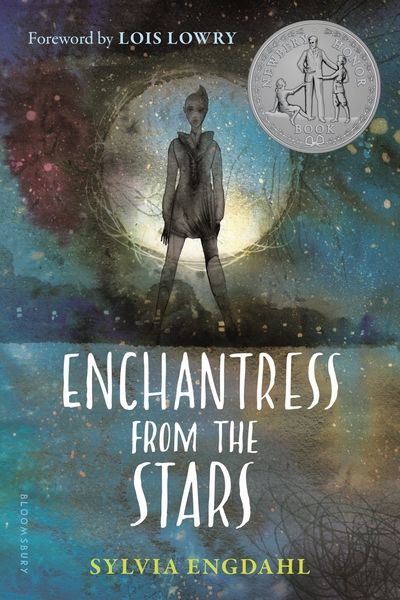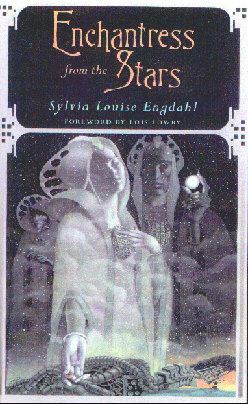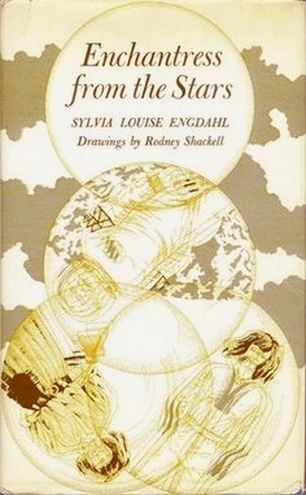
Reflections on Enchantress from the Stars
by Sylvia Engdahl
This is a more detailed and formal presentation of things I have been saying in my FAQs and elsewhere for many years. Please read it, especially if you are a teacher who has discussed the book with young readers.*
Authors are not supposed to tell readers how to interpret their books. Ordinarily it should be left to each reader to do so in his or her own way, and if the author fails to convey the intended meaning in the story itself, that is a flaw in the writing of it that no amount of explanation can remove. But in the case of Enchantress from the Stars, there has been confusion arising from its science fiction content that I feel needs clearing up.
Enchantress from the Stars is a book with more than one level and there’s much in it that I believe applies to people of our own time in our own world—ideas about the different ways truth can be seen, about the power of faith, and about love. But as I have been saying since its first publication, it dismays me when readers assume it is a wholly allegorical story rather than one literally about relations between species that evolved on separate planets. That was something I didn’t anticipate, and I don’t quite see why, in an era when respect for all cultures is viewed as important, so few people see the harm in it. Usually it’s okay for a book to be interpreted differently by different readers—but not when a common misinterpretation gives the impression that the author endorses a view of cultural relations on Earth that is generally considered not merely mistaken but “politically incorrect.”
To assume that the premises of Enchantress apply to relations among groups of the same species is a false analogy, and it leads to the conclusion that I view cultural differences in a way that was rejected by anthropologists long ago. Since I came close to getting a master’s degree in anthropology I don’t like having it thought, as it is by some critics, that I’m either ignorant or intentionally promoting that view, even apart from the fact that it’s not one that young readers should be encouraged to adopt.
It used to be thought that some cultures on Earth were “primitive” while our own culture was “advanced” in a more fundamental sense than its possession of modern technology. Today this idea is looked upon as obsolete and condescending. All independent cultures on this planet have been developing for the same length of time, although some have changed more than others. We are all members of the same human race, the same species. The different peoples in Enchantress, however, are of different species, some of which are biologically older than others and whose civilizations have existed for longer periods of time. The variance in their maturity is evolutionary, not merely cultural. Relations between them cannot be compared to relations among people with the same origin. Moreover, basic to the premise that interstellar contact would be detrimental to young species is the fact that the existence of more mature ones is unknown to them, a situation that cannot exist on any single world.
 To be sure, the fundamental idea that it’s wrong to treat others as subhuman and seize land that belongs to them does apply to Earth. But when readers carry the analogy further, the story seems to be saying that we should not offer any help to developing nations or to societies on our own world whose members are sick or starving, which I certainly didn’t mean to imply. Elana’s people hold that it would be harmful to give aid to less mature species because it would interfere with their evolution and prevent them from eventually making a unique contribution to the community of advanced civilizations. (Which is why I believe extraterrestrials will not contact us at our present stage, much as advocates of SETI hope they will). Extragenetic evolution, however, applies to a planetary civilization as a whole; it cannot be said that some groups of the same species are further evolved than others.
To be sure, the fundamental idea that it’s wrong to treat others as subhuman and seize land that belongs to them does apply to Earth. But when readers carry the analogy further, the story seems to be saying that we should not offer any help to developing nations or to societies on our own world whose members are sick or starving, which I certainly didn’t mean to imply. Elana’s people hold that it would be harmful to give aid to less mature species because it would interfere with their evolution and prevent them from eventually making a unique contribution to the community of advanced civilizations. (Which is why I believe extraterrestrials will not contact us at our present stage, much as advocates of SETI hope they will). Extragenetic evolution, however, applies to a planetary civilization as a whole; it cannot be said that some groups of the same species are further evolved than others.
Some readers have felt that the Federation in the story is rather high-handed in labeling the inhabitants of some worlds “mature” while others are not, and this would be a valid criticism if they had not been evolving for different lengths of time. In actuality, there is nothing arbitrary about the threshold I envision. The more advanced technology and less inhumane customs of the mature peoples as compared to the “Younglings” are consequences of their species’ age, not random characteristics by which they are subjectively judged. It is to be assumed that different cultures exist on all worlds, as they do on ours, though for sake of simplicity the story doesn’t show that; yet the civilization of each world as a whole either has reached a level where it can meet other worlds’ planetary civilizations as an equal, or it has not. This, of course, is not to say that all individuals of a given species are equally mature. In my novels only the agents of the Service, who are selected according to very high standards, are allowed contact with “Youngling” worlds, so the variations among members of mature civilizations are not mentioned. The level of a species, however, depends on the qualities of the majority of its people, which need not be possessed by all of them.
What defines that level? As I have said in the Afterword to Defender of the Flame and in that book and its sequel, as well as by implication in Enchantress, I believe it is the widespread development of consciously-utilized psi (psychic) powers, especially telepathy. Not only would such powers lead to a greater degree of understanding and empathy than exists among the people of a world at our present stage of evolution, they would be essential to contact with extraterrestrials whose physical appearance would offer none of the clues on which communication has depended since the dawn of history. Without telepathic rapport the gulf between species would be too wide to cross, and hostility or an intent to exploit would be suspected where none existed. Moreover, people who lacked such capability could not function effectively in an interstellar society based on it; they would feel isolated and deficient no matter how much respect they were given
 By telepathy, of course, I do not mean “mind reading”—telepathy as I see it is two-way communication and is voluntary, at least at the unconscious level, on both sides. It is latent in all of us and has influenced history to a far greater extent than is imagined. The degree to which it can come under conscious control is unknown, and the use of it in my fiction does not pretend to be a realistic portrayal of a faculty beyond our present understanding. Undoubtedly it would not take the form of conversation as it has to be presented in writing; I suspect it would be entirely wordless. And a society in which it was common would not be as much like ours as the ones in the stories.
By telepathy, of course, I do not mean “mind reading”—telepathy as I see it is two-way communication and is voluntary, at least at the unconscious level, on both sides. It is latent in all of us and has influenced history to a far greater extent than is imagined. The degree to which it can come under conscious control is unknown, and the use of it in my fiction does not pretend to be a realistic portrayal of a faculty beyond our present understanding. Undoubtedly it would not take the form of conversation as it has to be presented in writing; I suspect it would be entirely wordless. And a society in which it was common would not be as much like ours as the ones in the stories.
Whether any other psi powers ever approach the level described in my novels is an open question. I have intentionally exaggerated them not just for plot purposes, but to symbolize my belief that evolutionary advancement is not merely cultural but involves factors beyond our ability to truly imagine. I feel sure that we will ultimately develop conscious control of telepathy, but it’s unlikely that future evolution will give us the ability to place our hands in fire without being burned, as Elana and the characters in my adult novels do. That is meant simply as an indication that evolving far beyond our present stage would involve developing capabilities that sociocultural change cannot produce.
There is another reason why I’m sorry that so few readers take the relationships between worlds in Enchantress seriously. One of my aims in writing it was to influence young people’s attitude toward extraterrestrial aliens. In the movies and in prevalent UFO lore, aliens are generally portrayed as hostile and repellant. On the other hand, some people view extraterrestrials as benevolent “gods from outer space” who would either consider the problems of Earth evidence we are an innately deficient species and a danger to the galaxy, or would tell us how to solve those problems—as in fact some scientists hope they will if radio contact with them can be made. In my opinion none of these ideas are constructive. They don’t encourage effort to solve our own problems, and what is worse, they foster a negative view of the wide universe from which Earth cannot remain isolated.
This is not an issue to dismiss as silly or inconsequential. It doesn’t matter whether any aliens show up within the lifetime of young people living today (which, for the reasons given in my novels, I personally believe they won’t). The view of our place in the universe absorbed by the young will be passed from generation to generation and will shape the future of our civilization. It may even affect the pace of our progress toward becoming a starfaring species, which I consider essential to our long-term survival. And if representatives of advanced extraterrestrial ones ever do appear, we surely don’t want assumptions drawn from alien invasion stories to affect our reception of them.
For both these reasons, I have mixed feelings about the commonly-expressed idea that Enchantress from the Stars is “half fantasy and half science fiction.” There is no fantasy in it, except in the sense that all science fiction contains material that is purely imaginary. Portions of it are told in the literary style of fantasy, which is something quite different from having elements of fantasy in the story. Insofar as the misconception attracts readers who enjoy fantasy more than typical science fiction, calling it a mixture is a good thing; yet it also leads to the assumption that none of the story is meant to be taken literally. All good fantasy has a level on which the outlook toward life embodied is, in the author’s opinion, valid—but on the level of the story’s action it is not intended as serious speculation. Even when it is satire on past or present human events, it does not attempt to say more about the future than that mistakes of the past should be avoided. The creator of a fantasy world does not expect readers to wonder whether a comparable world, or situation, really exists somewhere. It is taken for granted that it is imagined simply to highlight thoughts about the here and now.
Science fiction, on the other hand, usually does say something about the future, albeit not at all literally with regard to the details. For example, “space opera” about battles with aliens assumes and instills the idea that because war has been common among humans, war with extraterrestrials is to be expected. Such ideas may not reflect the author’s actual views—though often they do—but they affect how readers feel about what lies ahead for humankind. This is particularly true of young readers. They don’t necessarily believe the underlying premises of a story consciously, but they absorb them unconsciously and pass them on. If a story is set in the future, it will have an emotional impact on attitudes toward the future, and calling it fantasy will not lessen that impact. And I think that the extent to which this is recognized by classifiers matters.
I would like to believe that my readers’ feelings about our place in the larger universe is influenced, to at least a small degree, by imagining what relationships with extraterrestrial species might involve. So it disturbs me when they are led to think that the different peoples in the novel are merely different cultures of our own species in disguise. It is true that in one respect my portrayal of them is indeed a mere reflection of human cultures, since it is based on human mythology—on the comic-book image of space explorers prevalent in the twentieth century as much as on the myth of dragon-slayers derived from fairy tales. This does confuse the issue somewhat, especially since to my surprise many adult readers thought the invaders in the story were stereotyped rather than intentionally depicted in terms of a modern myth comparable to the older one.
Actually, the Imperials were no more meant to be realistic than the medieval characters. Moreover, they are an anachronism; a civilization advanced enough to build starships would not behave as our ancestors did. Even today, no one in a position to form space policy would consider colonizing a planet that has indigenous inhabitants. Yet the basic idea that humans, and presumably extraterrestrial civilizations, do advance—that the invaders were immature rather than collectively evil and could be expected to outgrow their aggressiveness—is, I trust, powerful enough to override such incongruities. It is this concept that should be taken literally, not the details that form the story’s plot.
And it is this concept, more even than the novel’s premise about relationships between our world and others, that I hope young people will absorb. Few readers have any grasp of the time scales involved in human progress. They are thus apt to think no progress is made, despite the fact that men of the past viewed war as glorious and desirable, and slavery was considered normal even in this country less than two hundred years ago. Obvious though it is that most of us have become a great deal less barbarous than the people of ancient times, all too often today’s problems are seen as an indication that human behavior will never be any better—yet lack of change within a few generations means nothing in view of the centuries yet to come. Elana’s people judge progress from the perspective of experience with many planetary civilizations over a long period of time. I hope imagining such a perspective will help readers realize that neither our own future actions nor those of any aliens we may meet can be predicted on the basis of our present stage of evolution.
I believe that we have an exciting future ahead among worlds beyond Earth, whether we meet any extraterrestrials or not. And it is not too soon to start caring how that future is envisioned, if only for the effect on the outlook of people today. That is why I write science fiction, and why the way my novels are interpreted matters to me.
Copyright 2017 by Sylvia Engdahl
All rights reserved.
This essay is included in my ebook Reflections on Enchantress from the Stars and Other Essays and in my book Selected Essays on Enchantress from the Stars and More.